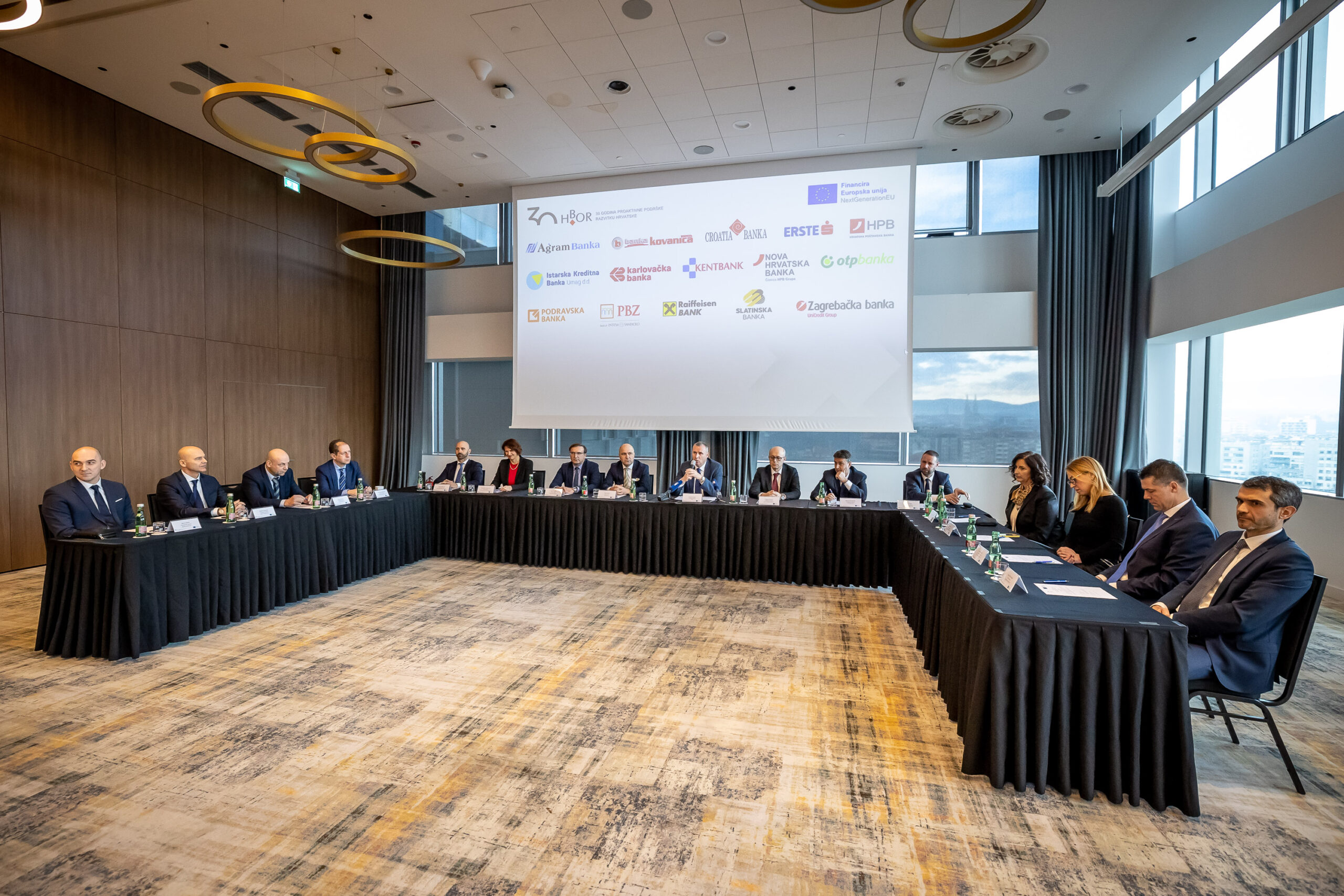
18.01.2023.
 On 18 January 2023, HBOR and fifteen commercial banks signed Cooperation Agreements on interest subsidy transactions from the funds of the National Recovery and Resilience Plan (NRRP).
On 18 January 2023, HBOR and fifteen commercial banks signed Cooperation Agreements on interest subsidy transactions from the funds of the National Recovery and Resilience Plan (NRRP).
Under the NRRP, HBOR was entrusted with the implementation of interest rate subsidy financial instruments in the amount of almost EUR 80 million, on the basis of which Agreements were signed today with commercial banks that will provide favourable financing conditions to a large number of entrepreneurs and public sector entities through their wide sales channels.
The commercial banks included in the implementation of the financial instrument are: Agram banka d.d., Banka Kovanica d.d., Croatia banka d.d., Erste&Steiermärkische Bank d.d., Hrvatska poštanska banka, dioničko društvo / HPB d.d., Istarska kreditna banka Umag d.d., Karlovačka banka d.d., KentBank d.d., Nova hrvatska banka d.d., OTP banka d.d., Podravska banka d.d., Privredna banka Zagreb d.d., Raiffeisenbank Austria d.d., Slatinska banka d.d. and Zagrebačka banka d.d.
In the context of a significant continuous growth of interest rates in the financial markets, the interest rate subsidy is an important instrument for mitigating the consequences of the crisis for business entities and public sector entities. Besides, the interest rate subsidy has a positive effect on the economy as it encourages the willingness of economic entities to invest, which increases the volume of investments in the Croatian market. It is expected that, by June 2026, it would be possible to support up to EUR 400 million in investment loans of private entrepreneurs and public sector entities with the Interest Rate Subsidy Financial Instrument. This instrument will help the Croatian economy and society to become more sustainable, resilient and ready for the challenges and opportunities brought by the green and digital transition.
The subsidy can be granted through loans for investments in fixed assets, from business start-up to the modernisation and extension of capacities. The amount of subsidy for a single loan is limited to EUR 500,000 for small and medium-sized enterprises and EUR 1 million for other entities in order to make such favourable loan terms and conditions available to as many borrowers as possible. The maximum subsidy of up to 3 percentage points is granted depending on the purpose and type of investment, and it can be up to 75 percent of interest rate for green and digital transition, up to 65 percent of interest rate for investments in special areas of the Republic of Croatia or in research, development and innovation as well as for public sector investments or for mitigating the consequences of earthquake, i.e. up to 50 percent of interest rate for other investments in competitiveness and resilience.
An additional benefit for beneficiaries of NRRP subsidies, and ultimately for the economy and the society of the Republic of Croatia as whole, is the adjustment of one's own business to "green" standards, since all investments within the scope of NRRP must meet the Do No Significant Harm principle.
______________________________________________________________________________________________________ Funded by the European Union – NextGenerationEU. The views and opinions expressed are solely those of the authors and do not necessarily reflect the official views of the European Union or the European Commission. Neither the European Union nor the European Commission can be held responsible for them.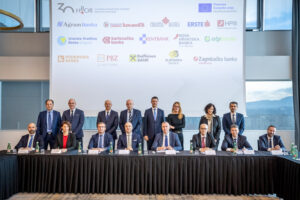
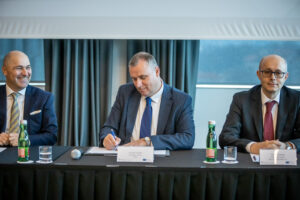
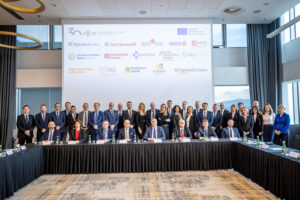
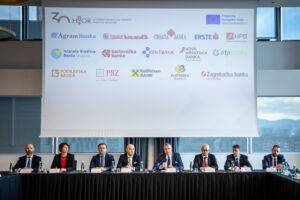
 On 18 January 2023, HBOR and fifteen commercial banks signed Cooperation Agreements on interest subsidy transactions from the funds of the National Recovery and Resilience Plan (NRRP).
On 18 January 2023, HBOR and fifteen commercial banks signed Cooperation Agreements on interest subsidy transactions from the funds of the National Recovery and Resilience Plan (NRRP).Under the NRRP, HBOR was entrusted with the implementation of interest rate subsidy financial instruments in the amount of almost EUR 80 million, on the basis of which Agreements were signed today with commercial banks that will provide favourable financing conditions to a large number of entrepreneurs and public sector entities through their wide sales channels.
The commercial banks included in the implementation of the financial instrument are: Agram banka d.d., Banka Kovanica d.d., Croatia banka d.d., Erste&Steiermärkische Bank d.d., Hrvatska poštanska banka, dioničko društvo / HPB d.d., Istarska kreditna banka Umag d.d., Karlovačka banka d.d., KentBank d.d., Nova hrvatska banka d.d., OTP banka d.d., Podravska banka d.d., Privredna banka Zagreb d.d., Raiffeisenbank Austria d.d., Slatinska banka d.d. and Zagrebačka banka d.d.
In the context of a significant continuous growth of interest rates in the financial markets, the interest rate subsidy is an important instrument for mitigating the consequences of the crisis for business entities and public sector entities. Besides, the interest rate subsidy has a positive effect on the economy as it encourages the willingness of economic entities to invest, which increases the volume of investments in the Croatian market. It is expected that, by June 2026, it would be possible to support up to EUR 400 million in investment loans of private entrepreneurs and public sector entities with the Interest Rate Subsidy Financial Instrument. This instrument will help the Croatian economy and society to become more sustainable, resilient and ready for the challenges and opportunities brought by the green and digital transition.
The subsidy can be granted through loans for investments in fixed assets, from business start-up to the modernisation and extension of capacities. The amount of subsidy for a single loan is limited to EUR 500,000 for small and medium-sized enterprises and EUR 1 million for other entities in order to make such favourable loan terms and conditions available to as many borrowers as possible. The maximum subsidy of up to 3 percentage points is granted depending on the purpose and type of investment, and it can be up to 75 percent of interest rate for green and digital transition, up to 65 percent of interest rate for investments in special areas of the Republic of Croatia or in research, development and innovation as well as for public sector investments or for mitigating the consequences of earthquake, i.e. up to 50 percent of interest rate for other investments in competitiveness and resilience.
An additional benefit for beneficiaries of NRRP subsidies, and ultimately for the economy and the society of the Republic of Croatia as whole, is the adjustment of one's own business to "green" standards, since all investments within the scope of NRRP must meet the Do No Significant Harm principle.
______________________________________________________________________________________________________ Funded by the European Union – NextGenerationEU. The views and opinions expressed are solely those of the authors and do not necessarily reflect the official views of the European Union or the European Commission. Neither the European Union nor the European Commission can be held responsible for them.




